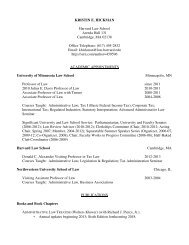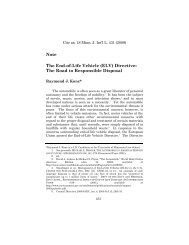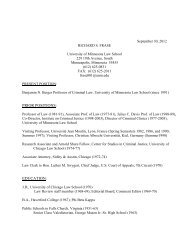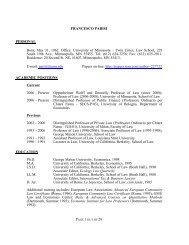Enabling Private Ordering - the University of Minnesota Law School
Enabling Private Ordering - the University of Minnesota Law School
Enabling Private Ordering - the University of Minnesota Law School
Create successful ePaper yourself
Turn your PDF publications into a flip-book with our unique Google optimized e-Paper software.
2009] UMBRELLA CLAUSES 11<br />
enhance <strong>the</strong> capacity <strong>of</strong> host States to make credible and<br />
enforceable commitments in <strong>the</strong>ir relations with foreign<br />
investors by establishing effective, treaty-based dispute<br />
settlement and enforcement mechanisms for host State<br />
promises. Umbrella clauses allow host States and investors to<br />
achieve bargains that are more cost-efficient compared to <strong>the</strong><br />
investor-State cooperation that takes place outside <strong>the</strong> realm <strong>of</strong><br />
effective contract enforcement. This function <strong>of</strong> umbrella<br />
clauses, it is submitted, is not limited to mitigating inequalities<br />
between foreign investors and a host State stemming from <strong>the</strong><br />
sovereign power and prerogatives <strong>of</strong> <strong>the</strong> host State, but equally<br />
targets <strong>the</strong> shortcomings in dispute settlement and enforcement<br />
in <strong>the</strong> case <strong>of</strong> non-sovereign breaches <strong>of</strong> investor-State contracts<br />
by <strong>the</strong> host State. 19 In accordance with this function, a<br />
distinction between interferences <strong>of</strong> a governmental and those <strong>of</strong><br />
a commercial character is not adequate. Overall, umbrella<br />
clauses are understood to enable and streng<strong>the</strong>n forms <strong>of</strong><br />
“private ordering” in investor-State relations, forms that involve<br />
<strong>the</strong> empowerment <strong>of</strong> investors and States to cooperate and order<br />
<strong>the</strong>ir interactions based on consensual agreement reached<br />
among equals by way <strong>of</strong> negotiation. 20<br />
In order to forward this argument, Part II focuses on <strong>the</strong><br />
limitations <strong>the</strong> traditional dualist distinction between<br />
international and national law imposes on cost-efficient<br />
investor-State contracting and cooperation. It outlines <strong>the</strong><br />
significance <strong>of</strong> making credible commitments in order to<br />
immunize investor-State bargains from opportunistic behavior<br />
<strong>of</strong> <strong>the</strong> host State and to allow for efficient investor-State<br />
cooperation, and submits that this <strong>of</strong>ten requires effective<br />
enforcement mechanisms through independent third party<br />
dispute resolution. However, under both domestic legal systems<br />
and <strong>the</strong> customary international law framework, <strong>the</strong>re are<br />
shortcomings in regards to effective enforcement mechanisms<br />
for host State promises. Above all, <strong>the</strong> dualist framework <strong>of</strong><br />
international law, with its strict distinction between municipal<br />
and international law and <strong>the</strong> distinction between contract<br />
claims and treaty claims, attenuates <strong>the</strong> capacity <strong>of</strong> <strong>the</strong> host<br />
19. Cf. Pierre Mayer, La neutralisation du pouvoir normatif de l’Etat en<br />
matière de contrats d’Etat, 113 J. DU DROIT INTERNATIONAL 5 (1986) (noting that <strong>the</strong><br />
normative power <strong>of</strong> <strong>the</strong> host State comprises both its function as legislator and judge<br />
over <strong>the</strong> scope <strong>of</strong> enforceability <strong>of</strong> <strong>the</strong> promises it makes).<br />
20. Cf. Robert H. Mnookin & Lewis Kornhauser, Bargaining in <strong>the</strong> Shadow <strong>of</strong><br />
<strong>the</strong> <strong>Law</strong>: The Case <strong>of</strong> Divorce, 88 YALE L. J. 950 (1979).
















